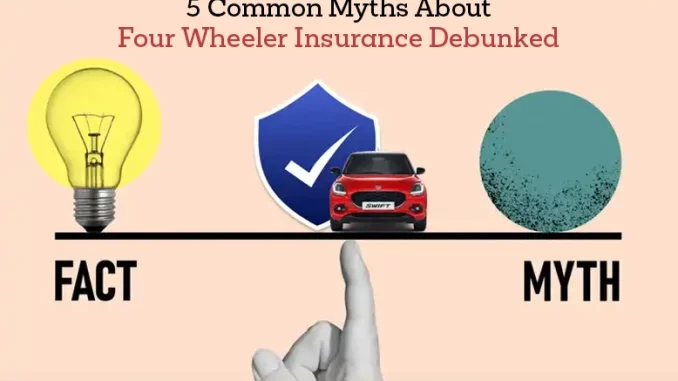
ar insurance is essential for every driver, but navigating the world of coverage can be confusing. Many people are influenced by myths and misconceptions that can lead to poor decisions when choosing or using their insurance. In this post, we’ll address and debunk five of the most common car insurance myths to help you make more informed decisions and ensure you have the protection you need.
1. Your Car Insurance Covers All Types of Damage
One of the most common myths is that car insurance covers every kind of damage. While insurance helps with a variety of situations, it does not cover everything. For instance, liability insurance only covers damage or injuries to others caused by your driving—it does not cover your own car. To cover your vehicle, you need additional coverage such as:
- Collision Coverage: Pays for damages to your car after an accident, regardless of who’s at fault.
- Comprehensive Coverage: Covers damage not caused by an accident, such as theft, vandalism, or natural disasters.
Without these additional coverage types, you could be left with high repair bills after an accident.
2. The Color of Your Car Affects Your Premium
There’s a persistent myth that the color of your car can influence your insurance premium, especially the belief that red cars are more expensive to insure. In reality, the color of your vehicle has no impact on your premium. Insurance companies don’t use color as a factor in determining rates.
What does affect your premium? The make and model of your vehicle, its safety features, and its repair costs are all much more important factors. For instance, high-performance or luxury cars tend to cost more to insure due to the expense of repairs and the likelihood of theft.
3. Your Credit Score Doesn’t Impact Your Car Insurance
Some people believe that their credit score doesn’t impact their car insurance, but in fact, many insurance companies do use credit scores as part of their pricing model, especially in states that allow it. Research has shown that individuals with better credit tend to file fewer claims, so insurers use credit scores as a predictive tool to assess risk.
A lower credit score may lead to higher premiums, while improving your credit could help you lower your rates. If you’re not sure how your credit affects your premiums, ask your insurer for clarification.
4. You Only Need the Minimum Coverage Required by Law
Another common misconception is that you only need to purchase the minimum amount of insurance required by law. While this may be the cheapest option, it’s often not enough to fully protect you in case of an accident. The minimum coverage is typically limited to liability insurance, which covers the costs of damage or injury you cause to others.
However, liability coverage does not cover your own damages, medical expenses, or the damages of others if they’re at fault and underinsured. To ensure that you’re fully protected, it’s worth considering:
- Higher Liability Limits: Protect your assets from being drained in case of a lawsuit.
- Uninsured/Underinsured Motorist Coverage: Covers costs if you’re in an accident with someone who has inadequate or no insurance.
- Medical Payments or Personal Injury Protection: Helps pay for your medical bills after an accident, no matter who’s at fault.
Opting for a more comprehensive policy may cost more upfront, but it could save you from financial devastation in the long run.
5. Your Insurance Will Always Pay for Rental Cars
Many drivers assume their regular car insurance will cover a rental vehicle, but this is not always the case. While some car insurance policies do extend coverage to rental cars, others may not. It’s important to check with your insurance provider to see if rental car coverage is included in your policy.
If your policy doesn’t cover rentals, you may need to purchase insurance through the rental agency or add it to your existing policy. Rental car companies often offer a few options, such as:
- Collision Damage Waiver (CDW): This coverage protects you from liability for damage to the rental car.
- Supplemental Liability Insurance (SLI): Provides liability coverage for damage or injury caused by your rental car.
Make sure you know exactly what your insurance covers before renting a car, so you don’t end up paying out-of-pocket for unexpected expenses.